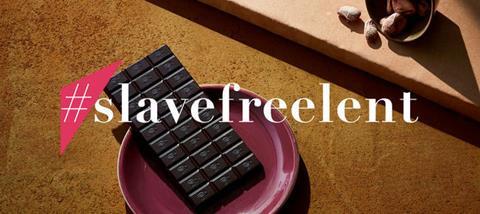
“I had scored 92 per cent in my 9th standard exams,” says 14-year-old Navya*, “but I could not continue my studies since I was working at the farm.”
Navya was kept away from a brilliant future in school when her family were tricked into a life of slavery on a silk farm in South Asia.
Trapped day in and day out on the silk farm, Navya was forced to work 13-hour days. Her food was restricted and she was regularly beaten to keep her and her family compliant. Slowly, the family lost hope.
Navya isn’t alone. Today, there are over 40 million people trapped in slavery. That’s more than everyone trafficked in the 200-year transatlantic slave trade combined. In fact, human trafficking is one of the top three most lucrative illegal business’ worldwide, generating over $150 billion of profit each year.
And all of us are funding it.

Slavery is illegal everywhere, but it’s usually hidden, and laws are often not enforced. It’s inadvertent and it’s indirect – but it’s inevitable. We may not be buying directly from slave-owners themselves, but slavery is lurking in the supply chains of hundreds of the products we use every day. An estimated 24.9 million people are held in forced labour and many of them – like Navya and her family – are making, mining or harvesting products that we consume in the UK every day. From the coffee we drink, to the chocolate we eat, to the clothes we wear. Hundreds of products that we use every day may have slavery hidden in their supply chains.
But there’s good news. At IJM we’ve found that slave-owners and traffickers are not especially courageous when faced with lengthy prison sentences. We’ve seen that slavery can dry up quickly in areas where we’ve supported local law enforcement to find and prosecute offenders. Slavery is more prevalent than ever, but it’s also more stoppable than ever.
It is possible to end slavery in our lifetime, but we all need to play our part.
Today, there are over 40 million people trapped in slavery. That’s more than everyone trafficked in the 200-year transatlantic slave trade combined. In fact, human trafficking is one of the top three most lucrative illegal business’ worldwide, generating over $150 billion of profit each year.
This Lent, International Justice Mission (IJM) – the world’s largest anti-slavery organisation – is launching the #SlaveFreeLent challenge. For 40 days, people across the UK will be challenged to take decisive steps towards living slave free. By joining this challenge, participants will become part of a global movement fighting to end this inhumane crime for good. Here’s how you can join in:
- Give Up a product that often has slavery in its supply chain for the 40 days of Lent. Make-up, coffee and chocolate are just a few of them.
- Donate what you save to help IJM stop slavery at source.
- Take Action by joining our WhatsApp updates - you'll get our exclusive #slavefreelent content—everything from top tips to epic stories of rescue—sent straight to your phone.
Navya didn’t know it, but rescue was coming for her. IJM investigators discovered her situation and worked with local police to gather evidence against the farm-owner. In partnership with police, IJM carried out a rescue raid on the farm. Navya’s abusers faced prosecution, and now she and her family are free – and she is back in school!
By joining the #SlaveFreeLent campaign, you can help bring freedom to families like Navya’s.
To sign up to #SlaveFreeLent visit ijmuk.org/slavefreelent
*Name changed to protect identity.




























